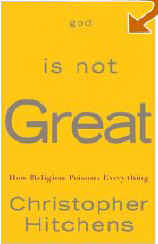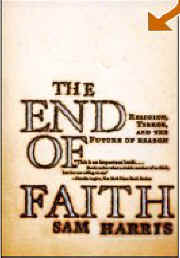

Editor’s Note: This article was written in reaction to a Letter to the Editor in the Stamford Advocate, which posed a list of questions that the writer seemed to think clinched the case for theism (and, perhaps, Christianity as well). Although I don’t believe the case for atheism has been proved (or even can be proved at this point), I think it’s at least as rational and plausible (if not more so) than the case for religion. But, you can judge for yourself ... I have a feeling that everyone reading this has pretty much made up his or her mind by this point already, so it’s really all just hot air anyway.
A big-name scientist was giving a lecture on astronomy. After the lecture, an elderly lady came up and told the scientist that he had it all wrong.
“The world is really a flat plate supported on the back of a giant tortoise.”
The scientist asked, “But what is the turtle standing on?”
To which the lady triumphantly replied, “You’re very clever, young man, but it’s no use — it’s turtles all the way down.”
The United States is the most religious nation in the non-Islamic world, so few things annoy good Americans more than skepticism concerning the Almighty. Hence, it’s no surprise that the publication of several best-selling books by prominent atheists (including neuropsychologist Sam Harris and journalist Christopher Hitchens) would incite righteous indignation.
 |
Unbelievers comprise only 10% of our country’s population, so members of this generally despised minority rarely have the temerity to express themselves in print. But when they do, they provoke responses like a recent Letter to the Editor, in which one exasperated representative of the other 90%, Bob Saverine, accused atheists of claiming to have “the only belief that makes sense.” |
|
Sadly, some militant atheists do exhibit the same smug certainty about The Truth as the Taliban wings of Islam and Christianity. But someone should speak for atheism’s more-moderate agnostic wing — those infidels who don’t consider atheism the only belief that makes sense, but believe it’s as plausible (albeit as equally unproven) as the myriad conflicting and contradictory doctrines espoused by the other nine-tenths of Americans.
Mr. Saverine opines that, “atheists have some questions to answer,” evidently unaware that the metaphysical queries he is posing have been addressed for centuries by some of the greatest minds in history — from Freud, Immanuel Kant and Bertrand Russell to Carl Sagan, Isaac Asimov and Richard Dawkins. Of course, it’s impossible for anyone to solve life’s great mysteries in a few lines of newsprint, but such questions at least merit a response.
How is it that there is a creation without a creator?
Science can now describe the evolution of the universe from a fraction of a second after the Big Bang until today, without the requirement, at any point along the way, to invoke a deity. Conservation of matter and energy makes it plausible (although not provable) that the components of the universe spewed out during the Big Bang have always existed in some form; hence, they didn’t need to be created. Is this The Truth? No one knows, but it’s as rational a theory as an anthropomorphic spirit forming the universe from a void, then shaping mankind from a pile of mud.
How are planets and stars in motion without there being a first mover himself?
This cosmological argument, which has been refuted by philosophers for centuries, is based on two premises: All effects have causes, and there’s a first cause (a supernatural “prime mover”), which is itself uncaused. Oddly enough, these two conditions are mutually contradictory: Either every effect has a cause (resulting in an infinite regression), or there are transcendent entities that don’t require a cause. The latter premise means it’s possible for something (God or the universe, for example) to have always existed uncaused. If you can believe in an uncaused deity, whom you can neither see nor touch, then why can’t you accept an uncaused universe, which you can see and touch?
How is there evident design in nature without a divine architect?
Order in nature does not demand a supernatural designer. For example, you can watch highly organized crystals form naturally with no help from any architect, divine or otherwise. The argument from design (also known as the teleological proof) was demolished by philosopher David Hume in 1779, as well as by Wallace Matson in 1965. And intelligent design theory has been rejected as scientifically unverifiable by a substantial majority of contemporary scholars. Oh, by the way, who designed the divine architect?
What are we to make of all the revelations of God in the Bible?
What are we to make of all the revelations of Allah in the Koran? Or all the other conflicting revelations of the hosts of other deities in mountains of holy books down the ages? For that matter, what are we to make of the revelations of Zeus and Athena in Greek mythology and the Vikings’ Thor and Odin?
What are we to make of this person Jesus?
What are we to make of this person Mohammed, whose message does not readily accord with that of Jesus? And what are we to make of all the other holy men from Zoroaster to the Buddha and their contradictory messages?
… and the Christian martyrs who chose to give up their lives?
Are no different than the Islamic martyrs who’ve died (and killed) for their beliefs throughout history. Mankind had always been eager to kill and be killed for God … any God. As we’ve discovered in Iraq, the world never runs short of martyrs.
If the world had no beginning, who caused it to come into being?
 |
If you carefully read Mr. Saverine’s final question a dozen
times, you still won’t be able to make sense out of it. Its two clauses
are simply incompatible. Any answer to it would be like a solution to the Zen
Buddhist riddle about what your face looked like the day before your parents were
born. Such speculations have little to do with logic and even less to do with
concrete data.
Questions like Mr. Saverine’s elicit the sorts of responses that inspire creation myths, fairy tales and religious faiths. They’re like the answers to the questions we asked as children when we looked up at an infinite sky and wondered what’s out beyond the end of the universe or who created God. |
Faith is the belief in things unseen and unknowable, and neither side in the God vs. atheism debate has a shred of real evidence. If you have information, you don’t need faith. If you have faith, no amount of data is likely to change your mind.
If either side actually had The Truth, this debate would have ended centuries ago. That’s why the world will always be filled with religions, and the atheists will annoy them all.
Click here to return to the Mark Drought home page.